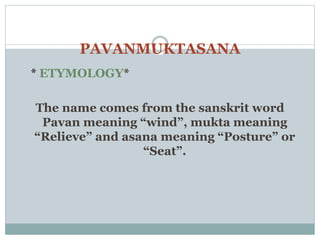Prashant Gupta Lying Asanas Yogic science
- 1. P R A S H A N T G U P T A M . P . E D A 3 0 1 4 9 1 5 0 2 3 PRESENTATION OF YOGIC SCIENCE
- 2. LYING ASANAS
- 4. PAVANMUKTASANA * ETYMOLOGY* The name comes from the sanskrit word Pavan meaning ŌĆ£windŌĆØ, mukta meaning ŌĆ£RelieveŌĆØ and asana meaning ŌĆ£PostureŌĆØ or ŌĆ£SeatŌĆØ.
- 5. P R O C E D U R E PAVANMUKTASANA
- 6. PAVANMUKTASANA PROCEDURE:- 1. Lay down in the Supine Position. 2. Exhale and while inhaling slowly raise the legs to a 90 degree angle from the floor. 3. Bend both legs at the knees and rest the thighs against the abdomen, keeping the knees and ankles together. 4. Encircle the knees with both arms, hands clasping opposite elbows. 5. Bend the neck and place the chin on the knees. Continue to maintain the asana, breathing normally.
- 7. PAVANMUKTASANA BENEFITS:- ’éŚ Stretches the neck and back. ’éŚ The abdominal muscles are tensed and the internal organs are compressed which increases the blood circulation and stimulates the nerves, increasing the efficiency of the internal organs. ’éŚ The pressure on the abdomen releases any trapped gases in the large intestine. ’éŚ Blood circulation is increased to all the internal organs. ’éŚ Digestive system is improved. ’éŚ Relieves constipation. ’éŚ Strengthens the lower back muscles and loosens the spinal vertebrae. ’éŚ Sterility and impotence.
- 8. PAVANMUKTASANA BENEFITS FOR WOMEN:- ’éŚ Massages the pelvic muscles and reproductive organs and is beneficial for menstrual disorders. ’éŚ Reduces fats in the abdominal area, thighs and buttocks.
- 9. PAVANMUKTASANA Precautions and Contra-indications: ’éŚ Must be avoided if there is recent abdominal surgery as there is a lot of pressure on the abdomen. ’éŚ Anyone suffering from hernia or piles should avoid this asana. ’éŚ Pregnant women should not practice this asana. ’éŚ If there is any pain, stiffness or injury to the next the head should remain on the floor.
- 10. 2. NAUKASANA
- 11. NAUKASANA ’éŚ ETYMOLOGY In Sanskrit ŌĆ£NaukaŌĆØ means ŌĆ£BoatŌĆØ and ŌĆ£AsanaŌĆØ means ŌĆ£PoseŌĆØ.
- 12. NAUKASANA PROCEDURE 1. Lie flat on your back on the yoga mat with your arms by your side. 2. Relax in this position for some time and keep breathing normally. 3. Now inhale slowly and lift your both legs as per shown in the above image. 4. Keep legs straight and should not be bent. 5. Raise your upper body to touch your legs with both hands. 6. Try to maintain the angle of 45 degrees. 7. Hold your breath and the posture for 10-15 seconds. 8. You can increase the time of holding posture by practicing regularly. 9. Now exhale slowly and get back to your starting position.
- 13. NAUKASANA Benefits of Naukasana (Boat-Pose) ’éŚ Helps to reduce belly fat. ’éŚ Improve the function of digestion. ’éŚ Good for developing six pack ABS. ’éŚ Regulates the function of pancreas, liver and lungs. ’éŚ Strengthens abdominal muscles. ’éŚ Good for diabetes patient to maintain the sugar level. ’éŚ Improves the blood circulation. ’éŚ Strengthens the muscles of thigh, hips, necks and shoulder. ’éŚ Improves the function of kidney, thyroids and prostate glands.
- 14. NAUKASANA Precautions for Naukasana (Boat-Pose) ’éŚ Suffering from low or high blood pressure, hip joint pain, arthritis, severe headache, migraine, hernia and ulcer patients should not practice naukasana (Boat pose). ’éŚ Consult a doctor first before practicing any exercise and practice under expert guidance. ’éŚ Pregnant women should not practice this boat pose. ’éŚ Avoid practicing during periods but if you are comfortable to practice then go ahead.
- 16. SETU BANDHASANA ETYMOLOGY Setu means ŌĆ£BridgeŌĆØ, Bandha means ŌĆ£BindŌĆØ, ŌĆ£LockŌĆØ and Asana means ŌĆ£PostureŌĆØ.
- 17. SETU BANDHASANA PROCEDURE 1. Lie flat on the ground and keep your arms at your sides. 2. Now lift your hips upwards as shown in fig as much you can (Should not over-stretch) with the help of pressing your palms. 3. Keep breathing deeply in this position for some time for 20-30 seconds. 4. Now relax by touching your hips to the ground i.e. your starting position. 5. Repeat this cycle for 3-4 times.
- 18. SETU BANDHASANA BENEFITS: 1. Strengthens legs, back neck and chest. 2. Relaxes whole body. 3. Reduces stress. 4. Calms the brain and reduces anxiety. 5. Good for pregnant women. 6. Improves digestion. 7. Cures back pain. 8. Cures insomnia. 9. Maintains the normal blood pressure. 10.Improves blood circulation.
- 19. SETU BANDHASANA PRECAUTIONS:- 1. Pregnant women should practice carefully and should not practice with full force during pregnancy. 2. Should be practiced under expert guidance. 3. Legs and feet should be parallel. 4. Those having injuries to the neck, shoulder and spine problem should not practice. 5. Always consult a doctor before practicing any exercise. 6. Pregnant women should always consult a doctor in the last 6-9 months of pregnancy before practicing Bridge pose to avoid any complications.
- 20. 4. HALASANA
- 21. HALASANA ETYMOLOGY The name comes from the Sanskrit words hala meaning "plow" and asana meaning "posture" or "seat".
- 22. HALASANA PROCEDURE 1. Lie on your back. 2. Join the legs together. 3. Relax the whole body (Shavasana position). 4. Keep the palm flat on the ground. 5. Keep breathing normally. 6. While exhaling press the palm on ground and raise both the legs upwards straight then try to touch the ground just behind. 7. Breathe slowly and hold the posture for several minutes (1-2 minutes). 8. Now slowly release the pose to return to Shavasana. 9. Repeat this for 3-5 times
- 23. HALASANA PRECAUTIONS: 1. Those suffering from hernia, slipped disc, sciatica, arthritis of the neck, high blood pressure or any serious back problem, should not do practice halasana. 2. Should practice under expert supervision. In days of periods women should not practice this asana. 3. Pregnant women should not practice halasana
- 24. Y O U THANK
























